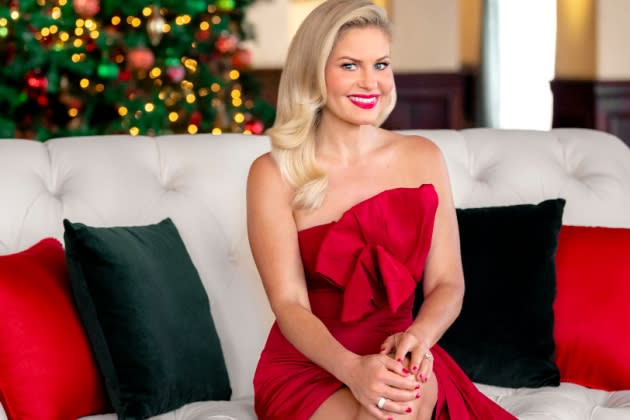
Candace Cameron Bure was the undisputed queen of Hallmark Channel’s slate of popular holiday fare, with more than 30 credits to her name. Who could forget her work as a high-strung doctor who moves to Alaska in “Christmas Under Wraps”? OK, just because you haven’t heard of it, doesn’t mean it wasn’t a huge hit. The 2014 made-for-TV movie has the distinction of being the most watched Hallmark Christmas special ever, landing almost 6 million viewers on its debut airing. (In fact, she stars in four of Hallmark’s top 10 most-watched Christmas premieres.) So, when Bure, 46, split with Hallmark to join rival upstart cable network GAC (now Great American Family) earlier this year, not even Santa himself could cheer up Hallmark.
The brains behind this Christmas steal wasn’t the Grinch. Instead, it was Great American Media president and CEO Bill Abbott, the former chief of Hallmark Channel’s parent company, who stepped down from his previous post in 2020 after he faced backlash for yanking a commercial featuring a same-sex couple. How did Abbott pull off such a big hire? By showing her the money. Sources tell Variety that Bure, whose contract ended around the time Great American Family was launching, was making around $1 million a year for her exclusive Hallmark deal, which, at one point, included at least two movies a year. Great American Family was able to nearly double that.
More from Variety
“The biggest thing about Christmas movies in general is that people make fun of them — and yet people love them,” Bure says. “It’s because they’re predictable: You know that someone’s going to fall in love. You know it’s just going to be happy and warm. And people run to that, especially at the holidays.”
Bure’s role isn’t just starring in new projects, but also now as an executive at the company, tasked with producing her own empire of Christmas movies. The first project on her slate is “A Christmas … Present,” where Bure will play a real estate agent who is celebrating the holidays with her recently widowed brother. According to Abbott, she “understands what the audience likes and what the audience doesn’t like, and that understanding for us is so critical to our success.”


Abbott didn’t originally think the movie was a fit. “It’s not the typical Christmas movie that we would do that is necessarily what has been successful, even for her, in the past. Yet, I have a lot of confidence in her,” he says. “It is life-affirming and makes you appreciate what you have and will give people great hope in really viewing what they have in a little bit of a different way through a different lens. She was 100% right. I was way off.”
Bure grew up in a conservative household in Panorama City, the daughter of a talent manager and a gym teacher. Her brother, Kirk Cameron, an outspoken Evangelical Christian, starred in “Growing Pains” as a teenager, but abandoned a traditional Hollywood career trajectory to star in the faith-based “Left Behind” movies. He stoked controversy in 2012 for saying being gay is “unnatural.” On the other hand, Bure, who is a devout Christian and a conservative, hasn’t waded into politics as much, despite her stint as a co-host on “The View.” She’s close to her children — Natasha, 24; Lev, 22; and Maksim, 20 — and has said in the past that she’s attracted to telling the faith-based stories she shares with them. It’s not surprising, then, that Bure understands Great American Media’s audience.
Things have changed in the holiday programming world in the past few years. While red-and-green decor signals to all that the Christmas season is here, if you’re in this business, you’re seeing only green. In 2021 alone, there were 144 TV movies in the months leading up to the holiday, with Netflix, CBS, ION, UPtv and OWN all throwing their Santa hats into the ring. This year, Great American Family is preparing to roll out 17 originals. UPtv also has 17, Hallmark will be producing 40 and Lifetime has 26.
And this comeback for the genre is no longer just on cable networks; every network has its own strategy. CBS, for example, has three original movies coming this season highlighting the network’s talent as Amanda Kloots (“The Talk”) and Liza Lapira (“The Equalizer), star opposite Paul Greene and Neal Bledsoe, respectively, men who’ve led holiday movies for Hallmark Channel. (Bledsoe and Greene will both also appear on Great American Family as well this year, pulling double duty.) Meanwhile, Lifetime is bringing in legends this year, with movies starring Rita Moreno, Patti LaBelle and Jane Seymour.
Made-for-TV holiday movies have become a pop-culture punchline, but for actors, they’re a way to make relatively fast money. A female lead actor can make up to $300,000 per movie that takes three weeks to film, while a male lead can make close to $200,000. For years, Hallmark was the top payer for holiday programming, but that’s changed.


When Netflix came into the game, it was willing to up the ante. Since its overall budgets are more than double what cable networks have, it’s able to land stars like Dolly Parton, Goldie Hawn, Vanessa Hudgens, Kurt Russell and Rob Lowe. One source tells Variety that while some of those movies were pitched elsewhere, Netflix was the only place able to pay bigger leading stars, often shelling out paychecks of more than $1 million per film.
“Over the past five years, we’ve built a sizable library of Netflix holiday shows and films and a proven dedicated audience who return year after year to watch both our new holiday offerings — as well as revisit their past favorites like ‘The Princess Switch’ and ‘Christmas Chronicles’ franchises,” says Christina Rogers, director of independent film at Netflix.
This year, the streamer has six original holiday movies in the pipeline, all with big stars attached, including Lindsay Lohan, Emma Thompson, Olivia Colman and Justin Hartley — all talent that doesn’t come cheap.
And the business of Christmas movies can lead to other sources of income. Now, much like Comic-Con and other fan conventions, the actors can earn money by signing autographs and taking photos with fans. Christmas Con launched in 2019, with 20 celebrity guests and 9,000 attendees; in 2021, attendees went up to 12,000. In addition to pricy day passes, fans can take part in a professional photo opps with stars like Lacey Chabert, Danica McKellar or Jesse Metcalfe, or buy an autograph for $80. Plus, each actor is paid a guaranteed rate to attend for the weekend — which can be anywhere from $10,000 to $75,000.
RomaDrama, which launched in 2021, is an exclusive fan experience that features actors of Christmas movies, flies talent first class and gives fans the opportunity to pay $400 for a five-minute sit-down chat with their favorite stars. Plus, fans have the chance to speak with award-winning authors and screenwriters with experience in the rom-com world.


But in the Christmas game, no one is bigger than Bure. Of course, she got her start as the beloved DJ Tanner on “Full House” at 11 — a role she played until she was 18. She then took a break from acting and, at 20, married former Russian NHL hockey player Valeri Bure and started a family. Ten years later, she “came back with a vengeance.” That comeback began at the Hallmark Channel.
“Bill gave me my first shot after taking a very long hiatus from work,” says Bure, who made her Hallmark debut in “Moonlight and Mistletoe” in 2008. “I will always be grateful to him for that.” But her return from full-time motherhood was just the start for Bure at Hallmark Media. In total, she appeared in 30 movies and hosted the annual “Countdown to Christmas” specials.
Though she eventually began producing on the network, she took on some meaty side gigs, including “Dancing With the Stars” and “The View,” where she sat on the Hot Topics table from 2015 to 2016. Though she loved being a talk show host, she didn’t like dishing about politics in public. On ABC’s “Behind the Table” podcast, in 2021, she said, “I didn’t want to be the punching bag for the next four years in that conservative seat.” Still, she can imagine going back. “I would love to do a talk show again,” she says. “But I don’t want to do a political talk show. That wasn’t that fun.”
“The View” was an opportunity she jumped at after saying “a lot of nos.” She says she booked another TV show that aired for “many, many years,” but changed her mind last minute since it’d be too tough to balance filming with her family time.
Unlike most child stars, Bure has found ways to continue to keep her brand relevant. She has written 11 books, launched her own clothing line, has partnered with Dr. Lancer Skincare and with Christian gifts company DaySpring to stay connected to her faith. Yet, Christmas movies are what she’s best known for now — which is why her departure from Hallmark was met with such interest. It comes after Abbott left the channel in a hail of controversy.
Within a year of exiting Hallmark, Abbott had set up a more conservative competitor — in June 2021, he partnered with Hicks Equity Partners on GAC Media, a new company that had acquired Great American Family. (The firm’s founder, Thomas Hicks, is a close friend of Donald Trump and co-chair of the Republican National Committee.)
Bure isn’t the only Hallmark staple who Abbott has brought with him to the new company. In 2014, he launched the “Kitten Bowl” on Hallmark, working closely with animal-rights activist Beth Stern, who is married to Howard Stern, to help find cats and kittens their forever homes. While the network discontinued the special, which has facilitated more than 75,000 shelter pet adoptions since its launch, it will move to Great American Family in February 2023, and has been renamed as the “Great American Rescue Bowl.”
Abbott and Bure hope to bring “The Aurora Teagarden Mysteries” film series, a franchise Bure has led since its 2015 debut, to their new home. “The world that she created around Aurora Teagarden was something very special, and certainly something we would love nothing more than to do more of,” he says. Bure adds, “It’s about putting puzzle pieces together, but it’s very possible.”


Bure may also reunite with a familiar face on the network: Her “Full House” aunt, Lori Loughlin. A special last Christmas marked Loughlin’s return to acting following her 2019 arrest and subsequent incarceration in the college admissions scandal. She also has a long-standing relationship with Abbott, having appeared in 16 “Garage Sale Mystery” films for Hallmark Movies & Mysteries before the network cut ties with her amid the scandal. Now, Abbott hopes to rebuild that relationship and eventually have Loughlin as one of the faces of Great American Family. They talk three times a week, he says, and are currently looking for the perfect script for her to lead.
“She’s America’s sweetheart, regardless of whatever happened,” Abbott says. “At the end of the day, she represents all that is positive about entertainment, and has had a stellar career — not only on screen, but also the way she’s conducted herself personally, in terms of being someone who has a track record of doing the right thing in the world at large, aside from whatever happened. She’s beloved and for good reason. We’re very proud of our association with her and want to make her part of the fabric.”
As it turns out, that fabric isn’t so different from the one that he championed at Hallmark before he left in a cloud of controversy.
Bure says that while there are similarities, Great American Family’s content will more strongly represent faith and pride in country. But so far, the network hasn’t followed the industry trends of hiring talent from diverse backgrounds. At Lifetime, 60% of the original 2022 movies are written by women, and people of color make up 54% of the channel’s leading cast members. Sixty-seven percent of its holiday movie originals feature people of color and/or LGBTQ leads. Meanwhile, Hallmark Movies & Mysteries has adapted the company’s Mahogany card brand into TV movies, telling stories through the lens of Black culture.
“People feel like we are now a home where they can bring projects to us, and that’s huge,” says Wonya Lucas, Hallmark CEO and president. “All you have to do is look at our audience composition of African American women prior to my getting there. African American women watch 50% more television than any other demographic, and we were largely missing out on that.”
Still, while Abbott may be manufacturing the kind of Christmas his viewers are clinging to, he says he believes that diversity and inclusion are important for Great American Family. “Sometimes we’re not thought of by people who are really good at those storylines and so we have to go seek them… In growing this business, it’s much a much heavier lift than I ever thought. I knew it was going to be hard, but not this hard. And so, we’ll get there, but it’s not an overnight thing.”
Abbott says that Great American Family is focusing on Christmas for now because he isn’t being pitched stories that celebrate other faiths. “Over time, I think we have the opportunity to do that,” he says. “We don’t have the luxury of having 30 people in development being able to take meetings with a lot of different people. We take as many as we can, but time is limited in the day.”
Bure adds, “I think we know the core audience and what they love is exactly how Bill originally built the Hallmark Channel. That was Christmas and those traditional holidays, so that’s what the focus is going to be. You’ve got to start somewhere. You can’t do everything at once.”
Best of Variety
Sign up for Variety’s Newsletter. For the latest news, follow us on Facebook, Twitter, and Instagram.





